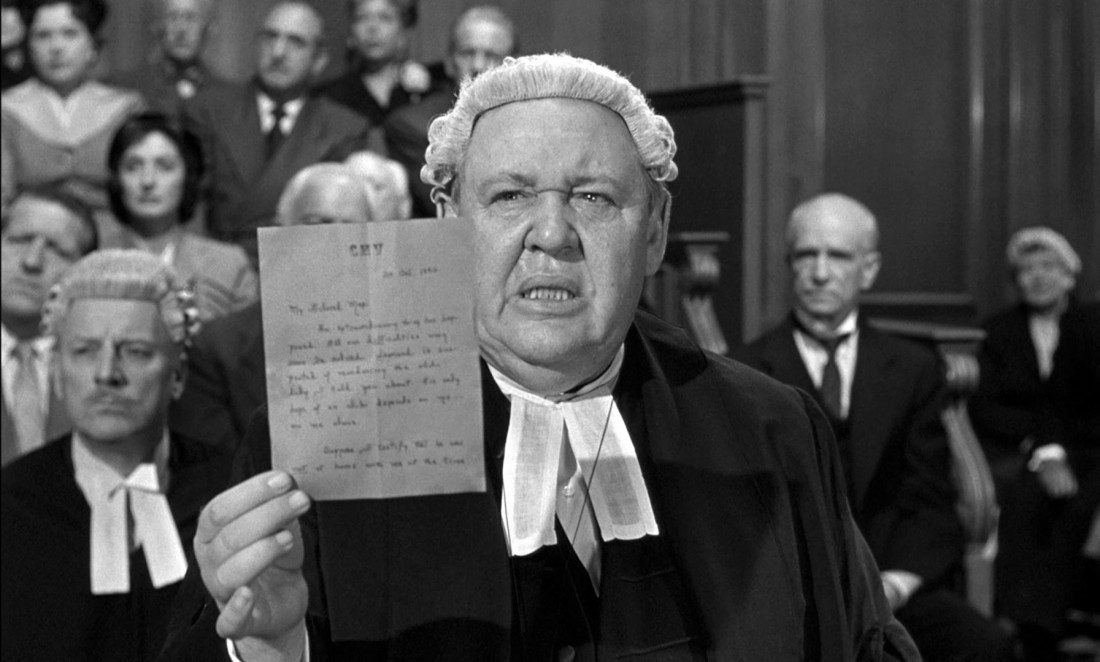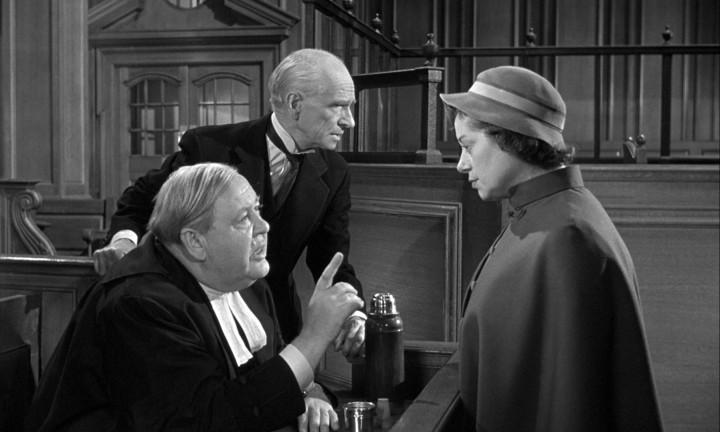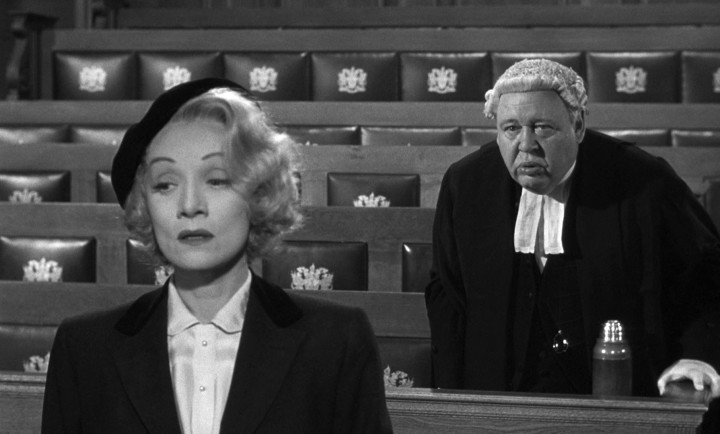Billy Wilder’s Witness for the Prosecution (1957) is one of those movies that I resisted seeing for years — for no very good reason apart to an ingrained aversion to courtroom dramas instilled in me by my mother’s over-fondness for Raymond Burr’s Perry Mason TV series. In fact, my first exposure to it came when it was paired Rene Clair’s And Then There Were None (1945) on an Agatha Christie double-bill at Florida State University. (I was on my honeymoon at the time — proving I know how to show a girl a good time.) I don’t know what I was expecting, but it wasn’t this very entertaining and clever-as-a-firkin-of-simians movie with a delicious twist ending that actually holds up under scrutiny.
I have neither seen, nor read Agatha Christie’s source play, but I feel quite certain that it would pale in comparison to the screen adaptation that Wilder and his co-writer cooked up. The film not only plays to the strengths of Charles Laughton as a sly comedic performer, but it adds the character of his demanding nurse, Miss Plimsoll, in a role seemingly expressly created for Laughton’s wife, Elsa Lanchester. While their marriage may not have been a traditionally happy one, their screen teaming here is a thing of beauty. The idea is that the great barrister Sir Wilfrid Robards (Laughton) is fresh from the hospital after a heart attack, and to keep him from over-taxing himself, he has been sent home with Miss Plimsoll as a safeguard. The roles are pretty obviously grounded in those of Sheridan Whiteside and Nurse Preen in the Kaufman and Hart play, The Man Who Came to Dinner. The uncooperative, acid-tongued patient and his much put-upon nurse are cut from the same cloth, but with certain differences. Here, the patient is a kind of overgrown schoolboy who views his nurse as an authority figure to be outwitted. Just how much she really is outwitted is another matter. Then again, it’s a given that Sir Wilfrid will ignore the order that he is to stick to comfortable civil cases. If he doesn’t take the murder case at the center of the story, there’d be no movie.
The case in question is whether or not “young” American ex-soldier Leonard Vole (Tyrone Power) murdered a rather silly, fairly wealthy middle-aged woman (Norma Varden) in order to claim an ₤80,000 inheritance. Sir Wilfrid is convinced of his innocence, but there’s a stumbling block in Vole’s wife Christine (Marlene Dietrich), who it turns out isn’t really his wife and is called as a witness for the prosecution — and whose evidence is quite likely to get Vole hanged. Despite a masterful defense — Sir Wilfrid demolishing the housekeeper’s (Una O’Connor) evidence is a joy to behold — Christine’s evidence remains pretty damning. As Sir Wilfrid notes of the jury, “Yes, they liked him, but they didn’t believe him. They didn’t like her, but they believed her.”
One of the twists turns out to be a surprising piece of last minute evidence — the least said about which, the better for those unfamiliar with the film — but it is only one of several such twists. Overall, it’s a nearly perfect combination of courtroom drama, mystery, and a healthy dose of comedy from Laughton and Lanchester. What doesn’t quite work is star Tyrone Power, who looks too old — and too worldly — for the role. At 43, Power more than shows his age. It doesn’t help, however, that every time the story strays from Sir Wilfrid, the interest level goes down a notch. Fortunately for the viewer, it doesn’t get away from him very long at any point. Whether trading barbs with his staff, attempting to dupe Nurse Plimsoll, or locking horns with Christine, his presence puts the film over the top.
The Asheville Film Society will screen Witness for the Prosecution Tuesday, Oct. 21, at 8 p.m. in Theater Six at The Carolina Asheville and will be hosted by Xpress movie critics Ken Hanke and Justin Souther.








Before you comment
The comments section is here to provide a platform for civil dialogue on the issues we face together as a local community. Xpress is committed to offering this platform for all voices, but when the tone of the discussion gets nasty or strays off topic, we believe many people choose not to participate. Xpress editors are determined to moderate comments to ensure a constructive interchange is maintained. All comments judged not to be in keeping with the spirit of civil discourse will be removed and repeat violators will be banned. See here for our terms of service. Thank you for being part of this effort to promote respectful discussion.